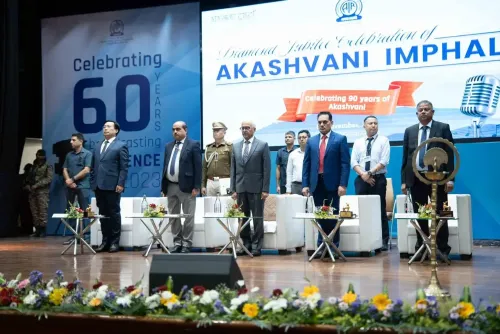PM Internship Initiative and Public-Private Collaborations to Enhance Workforce Readiness

Synopsis
Key Takeaways
- Significant decline in unemployment rate from 6% to 3.2% in six years.
- 61% of new net payroll additions are youth under 29.
- Female participation in the workforce rose from 23.3% to 41.7%.
- Public-private partnerships are vital for workforce skills.
- Expansion in digital and renewable sectors promotes job creation.
New Delhi, Jan 31 (NationPress) Programs such as internships within organizations (PM Internship Initiative) and public-private collaborations aimed at skill development and vocational training are crucial for cultivating a workforce prepared for industry, according to the Economic Survey 2024-25 released on Friday.
Moreover, by establishing a skilling ecosystem that nurtures a high-quality, globally competitive workforce, India can significantly enhance youth employability in international job markets, the report emphasized.
As per the Periodic Labour Force Survey (PLFS), there has been a notable decline in the unemployment rate in India, alongside improvements in both participation in the labor force and the worker population ratio.
The unemployment rate (UR) for individuals aged 15 and above has progressively decreased from 6 percent in 2017-18 to 3.2 percent in 2023-24.
Net increases in EPFO subscriptions have more than doubled, moving from 61 lakh in FY19 to 131 lakh in FY24, reflecting the formalization of the job market.
Approximately 61 percent of net payroll additions are attributed to those under 29 years of age, indicating that new jobs in the organized sector are predominantly going to the youth.
Results from the Annual Survey of Industries (ASI) for FY23 indicate a growth of over 7 percent in employment compared to the previous year, equating to an addition of over 22 lakh jobs in FY23 compared to FY19 (pre-pandemic level).
The Female Labour Force Participation Rate (FLFPR) has risen from 23.3 percent in 2017-18 to 41.7 percent in 2023-24, showcasing greater engagement of women in economic activities across various sectors, both rural and urban.
According to the Economic Survey, initiatives such as Mudra Yojana, Skill India, Start-Up India, and Stand-Up India have been instrumental in promoting entrepreneurship, providing skill training, and assisting individuals in establishing self-sufficient and sustainable livelihoods.
The Economic Survey highlighted that increasing women's participation in entrepreneurship could drive the nation towards higher development levels by leveraging their latent potential to contribute to economic activities.
To boost women's entrepreneurship, the government has implemented various initiatives aimed at improving access to credit, marketing assistance, skill development, and support for women-led startups.
Furthermore, it emphasizes that to achieve long-term stability, a fair and just distribution of income between capital and labor is crucial. This is essential for maintaining demand and fostering corporate revenue and profitability growth in the medium to long term.
The Economic Survey also observed that the expanding digital economy and renewable energy sector are creating significant opportunities for job generation.
Both sectors present vast potential for increasing employment, especially by opening up avenues for women, leading to their financial independence and empowerment.









